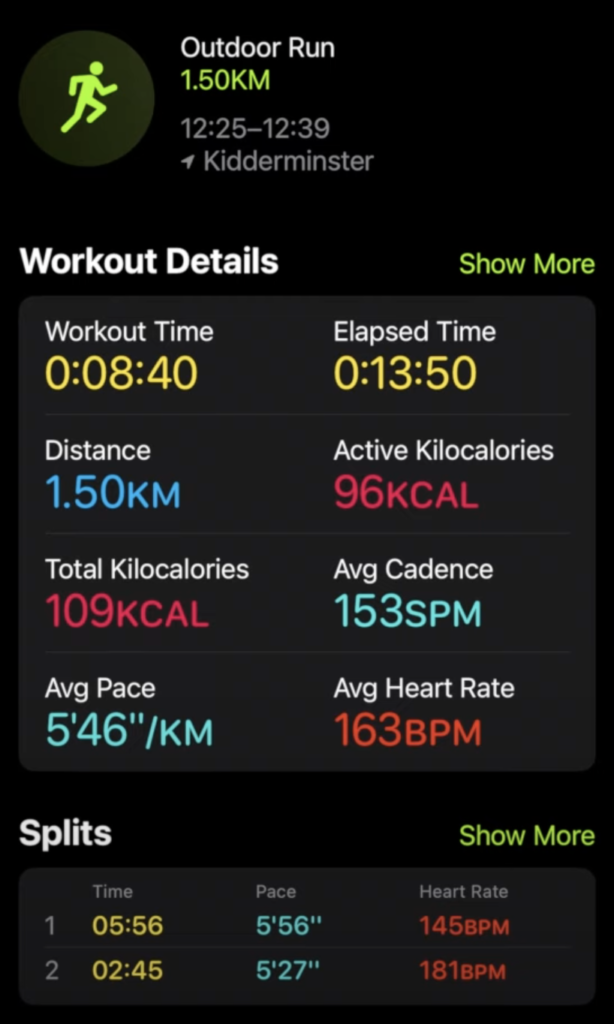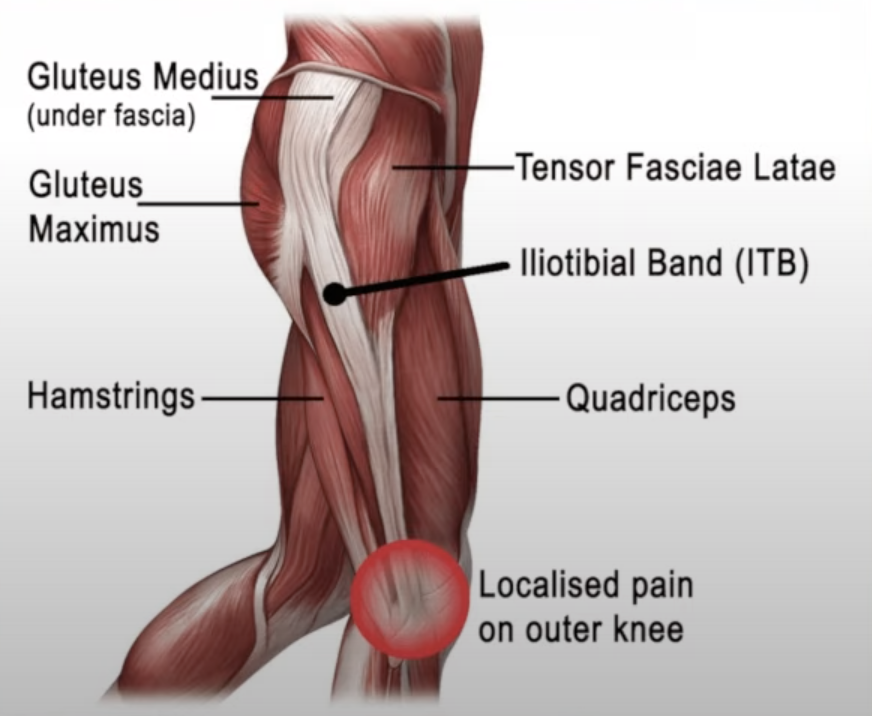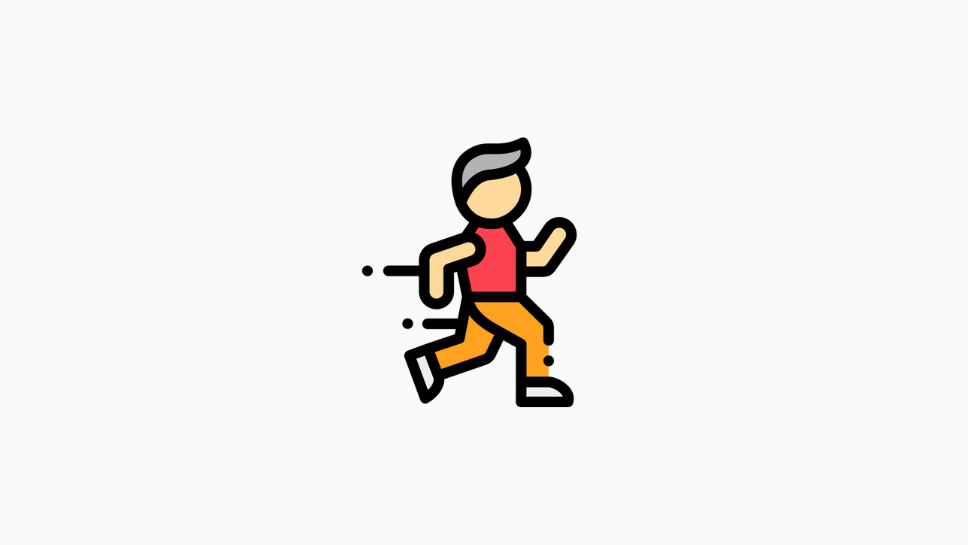Table of Contents
This time last year my fitness was at an all time low.
But, two weeks ago I ran my very first marathon and it’s completely changed the way I think about my life.
So, I thought I’d share with you the 5 key lessons I’ve learnt from running it.
🧠 Lesson 1: Mental Adaptation
Twelve months ago I was super unfit.
I’d been unable to run for a couple of years (a story for another time…) and the limited amount of exercise I did largely centred on resistance training and trying to get hench (still in a work in progress).
I also didn’t really think there was much point to running. It was time consuming, damaged your joints, and was counter-productive to my goal of building muscle.
So, it got to a point during christmas last year where I was eating all these mince pies and I just thought to myself ‘what the hell am I doing? I’m in a reasonable shape, but I can hardly navigate a flight of steps without feeling out of breath. It’s only going to go downhill from here’.
I won’t lie it took me another three months from this point to actually do anything about this thought. But I eventually did my first run on April 16th – a 1.5km run to my gym that took me 8 and a half minutes to complete. It was bloody exhausting.

But 2 or 3 months later, I was consistently doing 10km runs and loving how much fitter I was starting to feel.
And this is why my first lesson is about mental adaptation.
Things can often feel pretty much impossible when we first start out. But, discomfort almost always leads to growth. And as long as we keep showing up, our body and mind will adapt.
In fact, in sports training there’s this thing called the SAID principle, which stands for Specific Adaption to Imposed Demand. And the idea is that when the body is placed under some form of stress, whether biomechanical or neurological, it starts to make adaptations that allows the body to get better at withstanding that specific form of stress in the future.
And this prinicple plays out in every area of our life.
For example, let’s say you spend hours practising the piano, the part of your brain that controls hand coordination will actually grow larger. And the neurons responsible for the coordinated finger actions will develop better and faster lines of communication between themselves.
So, the bottom line is that short-term stress is not just good for growth, but actually the only way we CAN grow. And if something’s too easy, you’re probably not growing at all.
🚀 Lesson 2: The Limit of Performance
This brings me to my second lesson: the limit of performance is much higher than we think.
I did a challenge earlier this year where I decided to run 4 miles every 4 hours for as long as I could. This was at a time when I’d barely ran further than 5 miles in a single day, so I knew this was going to be pretty tough. And my tentative prediction was that I’d make it to mile 16 before my legs gave up on me.
It turned out that 40 hours later I was still running and had pushed myself well beyond my mental and physical comfort zone. Even though at hour 20 I was already telling myself stuff like ‘right Gareth, it’s time to quit, order some nice food, and get some sleep’.
The point of this story is that everything is mental: when our mind is telling us that we’re done, that we’re exhausted, that we can’t possibly go on any further, we’re probably only actually about 40% done.
It’s always possible to draw on an untapped pool of energy, motivation, and drive that keeps us going no matter how much we feel like quitting. Whether we’re running, studying, building a business, or learning a new skill, the limit of performance is often much higher than we initially perceive it to be.
But, most of us instincitvely avoid suffering and hard work. Sure, it’s a natural human response to seek comfort – we’d all rather be in bed or watching Netflix than studying for an exam or closing a deal – but it’s also a fundamental truth that the most rewarding and transformative experiences
🤖 Lesson 3: Process over Product
It’s easy to get caught up in the end goal, whether it’s running a marathon, achieving a specific weight, or hitting a career milestone. But, what’s truly transformative and enriching about any journey is the process itself – the daily grind, the small victories, and even the setbacks.
Now, it’s totally okay to think big when making plans. But, when we’re looking to make progress we need to think small.
When I started training for the marathon, I was solely focused on the day of the race. Every run, every exercise session was a means to an end. But as I progressed, I began to appreciate the process more.
The early morning runs, the discipline of sticking to a training schedule, and the learning curve of understanding my body’s needs and responses – all of these became valuable experiences in themselves.
There’s a quote that I really like that goes something like ‘the most important step a man can take is not the first one, it’s the next one. It’s always the next step’. And this neatly sums up the lesson here.
If I look back on my biggest wins in life, the best results have always been achieved through consistent daily action. By focusing on the present, I become more patient, more resilient, and more appreciative of the incremental progress I’m making.
Sure, we want to keep the end in mind to some extent, but focusing on the process helps in managing our expectations and reducing the pressure that comes with goal-oriented thinking. It encourages a healthier and more sustainable approach to personal and professional growth.
🥳 Lesson 4: Enjoy the Ride
Two months before running the marathon I injured my IT band, causing some amount of discomfort on the outside of my left kneee whenever I ran.

This clearly wasn’t ideal, especially given that a typical IT band injury takes around 6 to 8 weeks to recover from. And during this time the general recommendation is to do literally zero running. So, this was a pretty big setback.
But, it was also a reminder that our journey towards personal and professional growth is rarely linear. There are always going to be some number of obstacles, diversions, and unexpected turns. The key is to remain adaptable, be open to exploring new approaches, and learn from every experience along the way.
For example, I’d created this entire running plan in the lead up to the marathon with a goal of running it in 3 hours 45 minutes. But, this plan was now entirely pointless. It just wasn’t going to happen. So, instead, I had to work within my new limitation and adapt my goal to accomodate the change in circumstance.
This wasn’t going to make the race any less successful, it was just different. And that’s totally cool because things rarely go to plan.
In fact, however good or bad a situation is, it’s going to change at some point. Nothing good lasts forever. But, neither do the bad things.
Running has as many ups and downs as life. One day our run is spectacular, and the next day it sucks beyond belief. So throughout life, as with running, we can take comfort in the fact that when things are rough, they will get better. And we are realistic in that when things are wonderful, we will once again be challenged.
But, regardless of where we’re at in our journey, we should never compare ourself to anyone else.
There’s always going to be someone who is faster, in better shape, or stronger than us. If we base our opinion of ourself by comparing ourself to others we’ll just be disappointed. Our only mission in life is to live up to our own potential and enjoy the journey.
🎈 Lesson 5: The Beauty of Solitude
This segues nicely to this final lesson of enjoying our own company and recognising the beauty of solitude.
We live in a fast-paced, noisy world where we’re constantly surrounded by distractions, both technological and social. We check our smartphones within minutes of waking up in the morning and we struggle to watch something on Netflix without doing something on our phone or laptop.
I’m definitely guilty of this. I often find it difficult to just switch off or be alone.
But, over the last few months running has helped me to recognise the joy and freedom of being alone with my thoughts. I guess it’s a form of meditation for me.
Running alone allows me to clear my mind, focus on my thoughts, and connect with my inner self. It’s during these solitary moments that I can find clarity, gain new perspectives, and find solutions to life’s challenges.
In this digital age, where constant connectivity is the norm, the art of solitude is becoming increasingly rare and valuable. It’s a space where we can escape the noise, recharge, and return to our daily lives with a renewed sense of purpose and clarity.
So, whether it’s through running or some other solitary activity, embracing the beauty of solitude can be a transformative experience, offering a sanctuary for personal growth and self-reflection.
And, ultimately, we need to be happy and comfortable being by ourself. Because, the only person you’ll live your entire life with is yourself.

